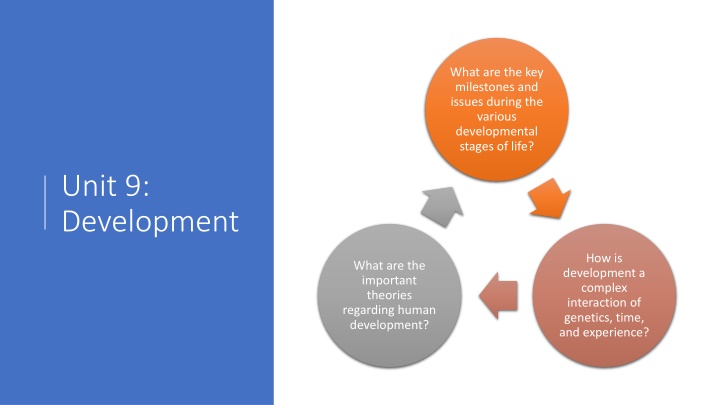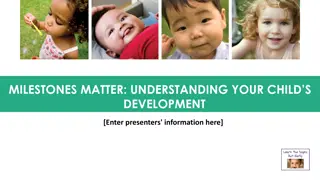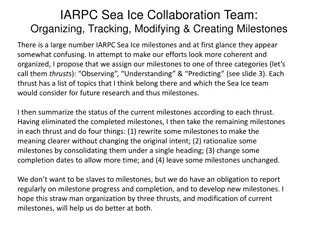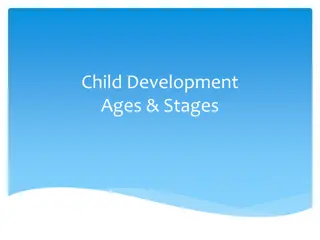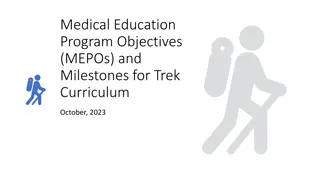Key Milestones and Issues in Human Development
Human development, Piaget stages, Kohlberg moral reasoning, Cognitive distortions, Developmental psychology
Download Presentation

Please find below an Image/Link to download the presentation.
The content on the website is provided AS IS for your information and personal use only. It may not be sold, licensed, or shared on other websites without obtaining consent from the author.If you encounter any issues during the download, it is possible that the publisher has removed the file from their server.
You are allowed to download the files provided on this website for personal or commercial use, subject to the condition that they are used lawfully. All files are the property of their respective owners.
The content on the website is provided AS IS for your information and personal use only. It may not be sold, licensed, or shared on other websites without obtaining consent from the author.
E N D
Presentation Transcript
What are the key milestones and issues during the various developmental stages of life? Unit 9: Development How is What are the important theories regarding human development? development a complex interaction of genetics, time, and experience?
Jean Piaget-Basics Pioneer in cognitive research-children s minds not a mini- adult mind ; interested in the mistakes of their thinking Rationalism: Mind develops in stages-we try to make sense of our experiences, construct our understanding of the world by interacting with it (reasoning about the physical world) Schemas: concepts or mental models that we frame the world Assimilate: we interpret our new experiences in terms of our existing schemas Accommodate: adapting our schemas to incorporate new information
Lawrence Kohlberg-Moral Reasoning Moral reasoning-thinking involved with considering right from wrong Levels serve as a ladder of moral development Level based upon WHY you decided (how you justify-not how moral you are) You cannot skip stages
Kohlberg-Moral Progression (View of person level and social perspective level)
Common Cognitive Distortions Common Cognitive Distortions A partial list from Robert L. Leahy, Stephen J. F. Holland, and Lata K. McGinn s Treatment Plans and Interventions for Depression and Anxiety Disorders (2012). 1. Mind reading. You assume that you know what people think without having sufficient evidence of their thoughts. He thinks I m a loser. 2. Fortune-telling. You predict the future negatively: things will get worse, or there is danger ahead. I ll fail that exam, or I won t get the job. 3. Catastrophizing.You believe that what has happened or will happen will be so awful and unbearable that you won t be able to stand it. It would be terrible if I failed. 4. Labeling. You assign global negative traits to yourself and others. I m undesirable, or He s a rotten person. 5. Discounting positives. You claim that the positive things you or others do are trivial. That s what wives are supposed to do so it doesn t count when she s nice to me, or Those successes were easy, so they don t matter. 6. Negative filtering. You focus almost exclusively on the negatives and seldom notice the positives. Look at all of the people who don t like me. 7. Overgeneralizing. You perceive a global pattern of negatives on the basis of a single incident. This generally happens to me. I seem to fail at a lot of things. 8. Dichotomous thinking. You view events or people in all-or- nothing terms. I get rejected by everyone, or It was a complete waste of time. 9. Blaming. You focus on the other person as the source of your negative feelings, and you refuse to take responsibility for changing yourself. She s to blame for the way I feel now, or My parents caused all my problems. 10. What if? You keep asking a series of questions about what if something happens, and you fail to be satisfied with any of the answers. Yeah, but what if I get anxious?, or What if I can t catch my breath? 11. Emotional reasoning. You let your feelings guide your interpretation of reality. I feel depressed; therefore, my marriage is not working out. 12. Inability to disconfirm. You reject any evidence or arguments that might contradict your negative thoughts. For example, when you have the thought I m unlovable, you reject as irrelevant any evidence that people like you. Consequently, your thought cannot be refuted. That s not the real issue. There are deeper problems. There are other factors.
Each stage has a particular psychosocial task-crisis that needs resolution Each stage builds upon successful completion of previous or those challenges may reappear later in life Identity Crisis Erick Erikson-Psychosocial Development
Parenting Styles & Learning Theories Operant Conditioning (Shaping) Positive Reinforcement Negative Reinforcement Positive Punishment Negative Punishment Observational Learning & Modelling 1. Authoritarian-impose rules and expect obedience 2. Permissive-submit to children s desires 3. Authoritative-demanding and responsive, exert control by setting rules and enforcing-but explaining reasoning Authoritarian-less social skill and self- esteem Permissive-aggressive and immature Authoritative-highest self-esteem; self- reliance, social competence Style and outcome is correlational Dispositions 3rd factor and culture
Additional Topics/Terms Blossoming & Pruning ( Use it or lose it principle ) Teratogens Chomsky & Language? Harlow, Attachment, Imprinting Habituation Self Concept, Theory of Mind, Autism Temperament Gender vs Sex vs Gender Identity vs Sexual Preference
